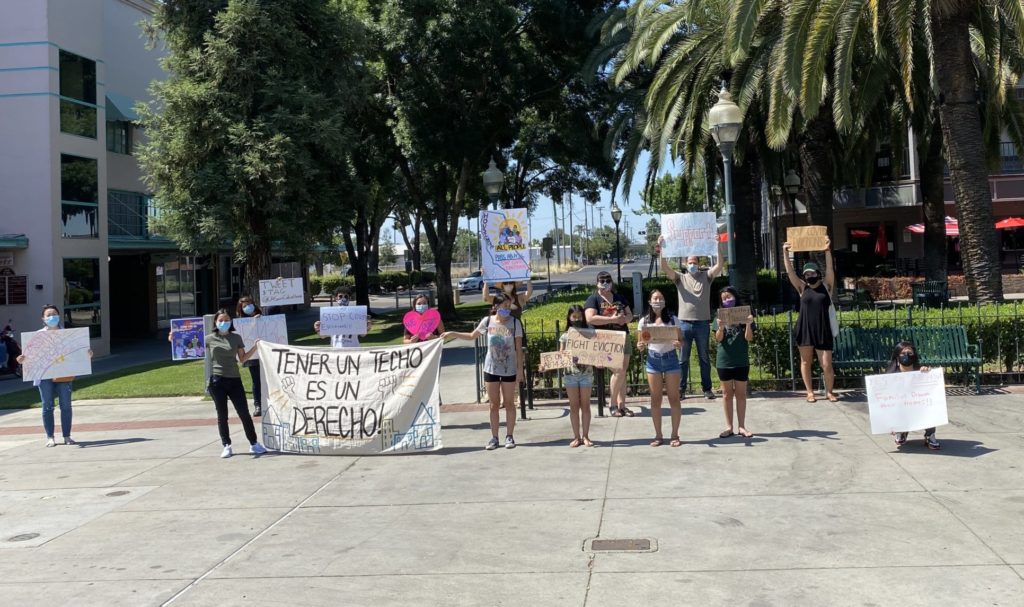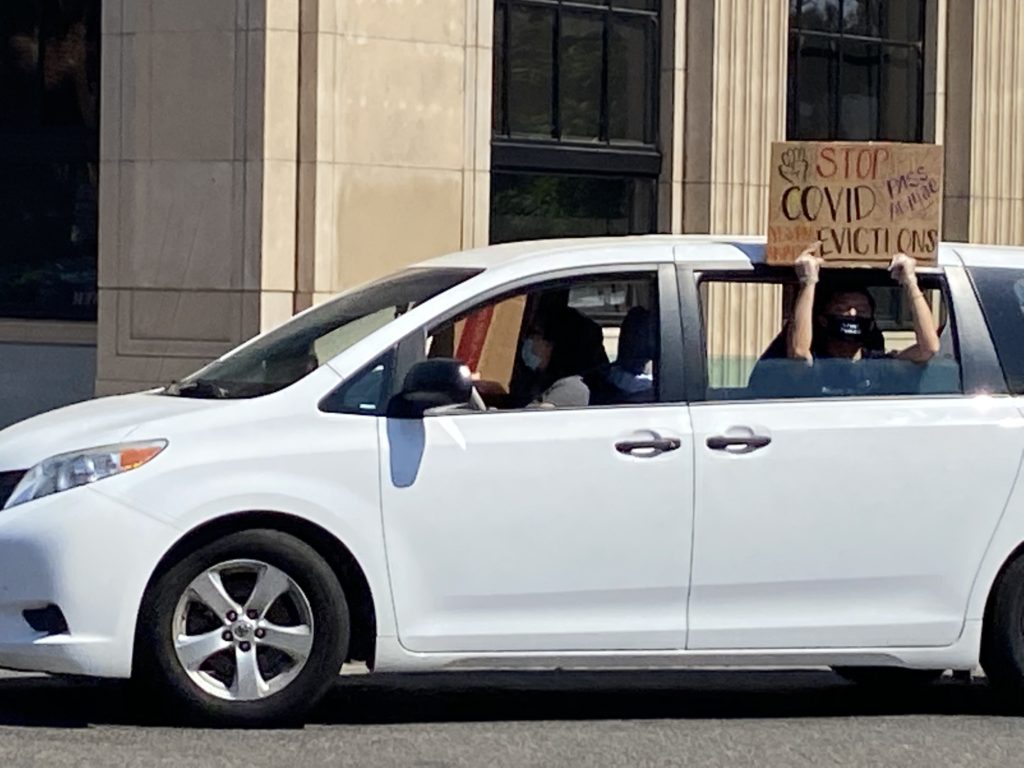Merced, California-
On July 13, Governor Gavin Newsom ordered a second shutdown for the state of California. Since then, 31 counties were on the monitoring list. These counties represent 80% of the state’s population. From these counties, nine lay in the Central Valley. An area, providing more than half of the fruits, vegetables, and nuts in the United States. In Central Valley, many workers can not work from home. Leading to local businesses and farmers, letting go of many of their workers. Ultimately, leaving many families unable to pay their rent and possibly forced out of their homes. On July 17th, Leadership Counsel, with collaboration with 99 Rootz and other local organizations, coordinated a “car-caravan” protest where Merced Locals peacefully gathered around Bob Hart Square in preparation to drive around Senator’s Caballero’s office, who represents the 12th district, in favor of bill AB-1436. Bill AB-1436 would prevent a landlord from forcing a security deposit or monthly rental payment between the time of emergency through April 1, 2021, or 90 days after the state of emergency has been lifted. Sequentially, protecting the tenant from an unlawful detainer if the default occurred during the time of a state of emergency. Later, amending that homeowners do not have to face foreclosure. They were ensuring that the bill protects a majority of the population.
The car-caravan came to be after protesters in Los Angeles San Diego, and other Major cities found a way to express their voice while following social distancing orders. Although creative, it has not been the first time cars have been utilized for political means. In 1956, Dr. King and other activists used a carpool system to boycott the segregated bus system in Alabama. Around the same time, a large percentage of African American families were investing more in cars in response to redlining, making it nearly impossible for POC to buy houses.
“TENER UN TECHO ES UN DERECHO!”
Translation: Having a roof is a right!

Participants of the caravan gathering on Main street next to Bob Hart square.
Written in bold letters, the banner hangs over Caballero’s office, reminding Merced representatives and natives not to turn a blind eye and to act during this crisis that requires everyone’s involvement, not just resting on the participation of those who are most affected. Evicting families who have lost their jobs during the pandemic creates a cycle that leaves many homeless and the production of goods to decline. 58% of Merced’s residents are renters. With that in mind, Merced’s demographic is mainly Hispanic, African American, and Hmong. African American and Latinx renters were two times more likely to report to be unable to pay their full rent than White renters.
Although Senator Caballero has not shown any opposition towards AB 1436, she co-introduced Bill 1410, that would give the renter and the landlord to sign an agreement. Giving the landlord the option to accept the tenant not being able to pay the amount owed, and the state would provide a tax credit of 80% of what the tenant would have owed. They will not pursue 20% of the tenant. The bill may seem like a viable option for the state. However, this assumes that the landlord and tenant are on good terms. 1410 grants more control to the landlord over the tenant by presenting the landlord the option to opt into the agreement, if they so choose.
“We want to give tenants the protection the power is never in the hands of the most marginalized,” says youth coordinator Sheng Xiong.
In some cases, Renters aren’t aware of their rights as renters and landlords utilize this to their advantage by giving eviction notices that give fewer days to leave the property than the proper amount. Providing notice is not filing for unlawful detainer.
With AB 1436, it provides coverage to renters regardless if they are aware of their housing rights. Shifting to the needs of the renters who are profoundly affected by the pandemic should be implemented to benefit those who are in the informal economy from farmhands to cleaning people who can not provide any documentation proof of being laid off.
As the contents of this bill have attracted attention throughout California, locally, it has shown great support as residents from Turlock, Hilmar, and Madera came and participated in the caravan. Roughly a dozen cars participated in the caravan, attracting more recognition around the surrounding area.
“The point of the caravan is to cause a disruption, to have folks get engaged by the excessive honking, colorful signs, and chants. At this moment in time, it requires us to be creative and bold.”
-Brenda Gutierrez 99 Rootz Youth Organizer
With the successful organization and execution of the car-caravan, it is possible to see another just like this in the future, as this may be the new means of expressing one’s voice. Even those who could not physically attend the drive up protest were still able to contribute their part by calling into Senator Caballero’s office. Furthermore, a public Zoom call was carried during the time of the event as an alternative means to participate.
As the number of Corona cases increases in California, the rate of unemployment will follow. It is uncertain when the second shutdown will be lifted or when the economy will recover. Bill AB 1436 will come to vote on August 4. Between now and the date the bill gets voted on, more residents will lose their income source and face losing their home.
TENER UN TECHO ES UN DERECHO!

Participants of the caravan gathering near bystander attention-holding “STOP COVID EVICTIONS” on Main street next to Bob Hart square
 Translate
Translate
